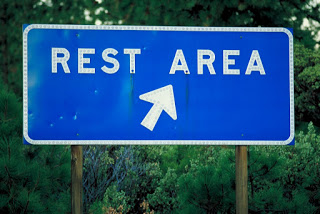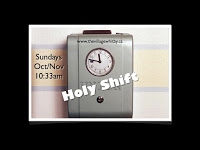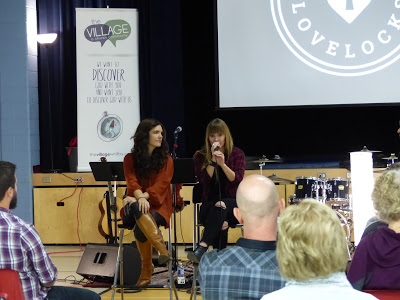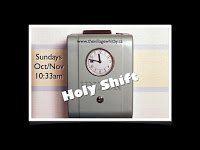
by Jonathan Manafo | Nov 16, 2015 | Sunday Conversations
Almost every tool we use needs some kind of rest. We shut them off, we recharge them, we reboot them. The need is real when you wake up in the morning and realize that you didn’t recharge your phone – it’s not a pretty sight is it. The funny thing is that we are quick to recharge batteries and phones and computers, but we don’t always shut ourselves off. Some recent surveys suggest that there is more self-imposed overtime these days than ever before. We are busy and we don’t care, because if we’re honest, it makes us feel better about ourselves. Busy is our standard answer to the common question, ‘How are you doing these days?’. However, as Eugene Peterson says, “Business is maybe the most vocation-destroying condition that there is.” How do we find a balance between working hard and resting well? How can we appreciate the work we are called to do while not neglecting our bodies and our minds?
Seems like God had a great idea when he created Sabbath. When we started this series we said that God was our first and best example of work. Interestingly, God is also our first and best example of rest. In the beginning…there was REST. Genesis 2:2-3 says that God, after working for six days, blessed the seventh day and made it holy. God called all the other days good, but this day of rest he called holy. God stops. God creates a finish line. God punches out and says, I’m done, for now. He didn’t do it for himself, because he was tired, he did it for us, to show us that stopping is just a important as working. In other places like Exodus 16 and 20 and 31 we are reminded how important this was to God and to his people, Israel.

Shabat means to stop, to cease, to desist. God’s invitation to participate in Sabbath was an invitation to stop what we are doing, stop working, stop producing, and to be reminded of the things that are important, mainly, Him, his covenant, and the people he’s placed in our lives to do life with (family, friends, community). This became for Israel both a practical way to live, while also being their philosophical identity – who they were in comparison to other nations. In Deuteronomy 5 we see that Sabbath was also a reminder that Israel were no longer living like slaves in Egypt. Sabbath was a weekly reminder that they didn’t have to go at it 24/7 any more; no one was forcing them to work all day, every day. God’s people would be different, they could stop producing and begin trusting…in God.
As much as Sabbath was intended for people, God also intended it for land and agriculture. You can read about this in Leviticus 25 & Deuteronomy 15. Israel is told to work the land for six years and let it rest on the seventh. Not only would they trust God to have enough, they’re also encouraged to give to those in need from their abundance. Sabbath had much to do with justice and generosity as it did with replenishing vessels, either human or earthly.

When we jump to the New Testament we find Jesus pushing back from religious leaders who want to force him to be strict about the Sabbath. Jesus, being a good Jew and Rabbi of course observed the Sabbath, but he wanted his followers to know that the Sabbath was there to serve them/us, not the other way around. What would be the use of being enslaved to a law that is meant to remind people that they don’t have to live in slavery any longer. In light of that, we can feel good about discovering some kind of Sabbath in our lives, without the religiosity or legalistic approach that some faith people attach to it.
So…in 2015, how can we appreciate and invite a principle that was instilled and created so many centuries ago? Great question. First know this, Sabbath is about people stopping long enough to be reminded about what is important to them in life. Those things should be Jesus, family, friends, community, etc. A few things to think about…
Sabbath is about Rhythm
Having a healthy rhythm to your life is so important. God’s idea of Sabbath leads us down that path. Feeling good about working hard while taking the right time to stop is the best way to live in balance. What kind of things add to our healthy Rhythm? Prayer, Scripture, Gathering in Community, Loving your neighbour, Working Hard, Playing Hard, Enjoying Family & Friends.
Sabbath is about Trusting God
By putting a stop to production we are reminded of something that is so important: We are not God. God provides for us. Sure we work hard and earn a pay check, but God is the one behind it all. Working without resting messes with our heads and gets us thinking that the world revolves around us. It doesn’t. It revolves around God. Rest/Sabbath actually makes God bigger in our eyes. Abraham Heschel writes, “The world has our hands for six days, but our souls belong to someone els”.
Sabbath is a Gift
Sabbath isn’t a reward for finishing on time or doing a good job; it’s an intermission in the middle of an ongoing game. Sabbath is like a boss who shows up with coffee and says, “Break Time”. Time is not a possession we own but a gift we are given to use and steward. It’s like money, it’s not ours to hoard, but ours to use wisely.
Sabbath is an Investment
Unlike sleep that forces itself on us, Sabbath has to be invited and welcomed. It’s not about a day it’s about an attitude. Start small: Pray a few minutes a day, not for stuff or requests, but simply to enjoy God and be thankful for what you have – Sit down for dinner without any distractions and simply enjoy your family – Enjoy the church community you’re a part of; when you gather, connect deeply – Find leisure activities that fill you up. Sabbath isn’t just about church, it’s about life; it’s an investment into your faith, your family, your community, yourself.
Before closing this post, pause to read these few texts. Breathe in and breath out and rest in God.
Be Still and Know that I am God (Psalm 46)
My soul finds rest in You (Psalm 62)
Come to me, you who are tired, and I will give you rest (Matthew 11:28)
– – – – – – – – – – – – – – – – – – – – – – – – – – – – –
small(er) group discussion
What resonated with you in this post/talk? What was difficult for you to digest?
Do you see Sabbath as an important principal that is too hard to follow or an old law that is outdated and unpractical?
Why do you think God called the 7th day holy? What’s holy about about rest? What’s holy about reflection? (Genesis 2:2-3)
Deuteronomy 5:15 says “Remember that you were slaves in Egypt and that you were brought out of there with a mighty hand and an outstretched arm. Therefore the Lord your God has commanded you to observe the Sabbath day.” Do you ever feel like you’re a prisoner of your job? What does this say about deliverance and being enslaved to your job or work?
What advice would you offer your small group as helpful ways to instil ‘sabbath’ moments into your life? How does one see Sabbath as Jesus did, a gift to serve us, not a law to be rigorous about?
What would you say about these two quotes on busyness?
“Busyness is maybe the most vocation-destroying thing there is”
“Busyness makes us stop caring about the things we care about.”
Some kind of Sabbath in our lives is healthy if we see it as a way to instil…
Healthy Rhythm/Balance
Trust in God
Seeing time as a Gift
Ways to invest in Faith, Family & Community

by Jonathan Manafo | Nov 11, 2015 | Sunday Conversations
This past Sunday we switched things up a little bit by hosting a main stream country duo, The Lovelocks. If you were there, you know that it was a whole lot of fun. Of course their music and vocals were outstanding, but so were the things they had to say about their faith and their calling to be musicians in the country music world. (And it’s worth noting at this point that The Village is totally blessed with stellar music every week…our band rocks!!!)
A few things stood out from the interview. Here are some highlights…
– Ali (violin/vocals) was introduced to Jesus through a youth pastor (pentecostal/evangelical) who began working in her United Church. This person introduced Ali to a faith that included a personal relationship with Jesus. It’s amazing how one can be part of a certain kind of church and miss the point of Christianity all together, it’s Jesus.
– Zoe was somewhat the opposite, she had grown up in a charismatic (perhaps pentecostal) church community and become numb to it all, after her time in college she discovered what it meant to really follow Jesus.
– They both eventually landed at The Meeting House (a church we actually network with) and through music, both served and even worked at this local church.
– After many years of serving and working in this setting they felt a nudge to write and play music that wasn’t intended for worship. Ali said that she just figured that God+Music=Worship; God would eventually show her that she was called to continue using her musical gift, but it would be in another arena. I wonder if we’re open to God blowing up our assumptions or perspectives for him to do something different in and through us.
– They both talked about how they feel like they can make a difference through their work. Sometimes it’s through a song pointing to something much bigger than your standard country tune, but most times it’s through the relationships they’re building and the people they are encouraging. And isn’t that the case for all our work relationships? Work is another space or opportunity to love our neighbour as our self.
– A line that hit me was one that is apparently used a lot in Nashville, “Hurry up and wait”. The context in Nashville would be arriving for a rehearsal or a sound check or a musical run through. You’ve hurried and now you’re waiting. Is this not the story of our lives? By that I mean many times we are given moments to be present with people, moments to be kind, thoughtful, patient, gracious, loving, honest, peaceful, encouraging, and yes, even moments to share God’s story with someone. What do we do with those moments? Those times when we’ve hurried up, and now we’re waiting, may we ask God to use us, as broken as we are, to be a light and a fresh presence to other broken people.
Songs thoughts:
– Lovely, the unreleased song they sang, was, well, lovely. It reminded us that because of Jesus, we are lovely, because of Jesus’ sacrifice for us, no matter how battered and scarred we are, God sees us as lovely. (1 Peter 2:4-5 & 9-10)
– Dance, one of their first songs, is a song about living life to the full (John 10:10). A subtle way for The Lovelocks to point people UP.
A word that has been in my mind and heart as we almost wrap up this series is the word ‘whatever’. It comes from the text we’ve been going back to every week, Colossians 3:17&24, ‘And whatever you do, whether in word or deed, do it all in the name of the Lord Jesus, giving thanks to God the Father through him…whatever you do, work at it with all your heart, as working for the Lord, not for human masters…It is the Lord Christ you are serving.’
As we’ve heard from the BroLaws, Colleen, and Steph, this week we’ve heard again through The Lovelocks, it’s in the whatever that God is present. How cool, how amazing, how profound, that in whatever we do, we can serve God; that God calls us to this and to that, but in all of it, he is present and he is using us. Whatever we do, we serve God. Wow!!!
– – – – – – – – – – – – – – – – – – – – – – – – – – – – – –
small(er) group discussion:
What did you take away from Sunday’s Interview?
Have you felt God calling you to something specific before? If so what did it feel like? If not, are you open to him doing that?
Do you identify with the saying, “Hurry up and wait”? What do we do with the moments and space God has given us? Ever thought of starting your day by asking God to use you in those moments?
Lovely, the unreleased song the LL sang on Sunday was a metaphor for God’s love for us through Jesus. Read 1 Peter 2:4-5 & 9-10. Any connections?
Dance, another song from Sunday’s gathering felt like a reflection on John 10:10. Are you embracing Jesus’ call to live life to the full (abundantly)?
We’re back to Colossians 3:17 & 23-24. What’s your whatever? Are you comfortable with it? Are you confident in it? Are you following Jesus through it?

by Jonathan Manafo | Nov 4, 2015 | Sunday Conversations

I’m a fan of all the Night at the Museum movies. Now I don’t like all of Ben Stiller’s work, but I do like many of his projects, the Museum trilogy being one of them. When you think of these films, what most often comes to mind is comedy, creativity, historical artifacts, and of course Robin William’s last performance in a movie. However, the main idea that jumps out to me is identity and purpose in your work/career. Larry (Stiller’s character) struggles to find and keep a job, but more than that he hasn’t found purpose in anything that he does. This is hard for him mainly because he wants his son to look up to him, and not having a ‘good’ job isn’t helping. The job at the Museum becomes his saving grace, in more ways than one. Larry discovers who he is while at the same time a job he can feel good about. But the struggle doesn’t stop; in the second movie, we find that Larry has moved on to the business world. He begins to be dissatisfied with his job and wants ‘more’. Jebediah, his small museum friend, reminds Larry that his place is in the Museum and that they need him there – that the museum needs him and he needs the museum
Why does Larry continue to struggle? Because our culture tells us that the better our job is, the better we are, the more money we make, the more significant we are.
If we’re not careful, we get stuck in the trap of defining who we are by what we do. It’s not bad to love your work or be proud of your job, it’s a good thing, however, defining yourself by your work (solely) would be a mistake. This would be like defining yourself by your stuff or your material possessions. Rather than finding significance from what we do, we should bring significance to what we do.
If we jump back to Genesis 1:26-31 we find God’s week of creation ending off on a high note – he creates man & woman. He creates us and then gives us something to do, work. As we read the closing part of that section we are reminded about where our identity really comes from.
So God created mankind in his own image,
in the image of God he created them;
male and female he created them.
God saw all that he had made, and it was very good.
We are made in HIS image and we are GOOD. Humanity has been trying to get back to that ever since. After the fall in Genesis 3 we have been longing for redemption, restoration, wholeness and IDENTITY. Jesus is the climax of this longing. fast forward to the gospels and we discover that Jesus is the only one who brings those things back to us.
John 15 says that we are no long servants, but we are his friends…chosen. Romans 8 says that nothing can separate us from the love we have in Christ Jesus. Nothing. And 1 John 3:1 reminds us that God’s love is lavished on us, and because of Jesus we can be called God’s children. “That’s what we are”.
So because of that truth, because of that new reality, because of Jesus, we can view work in a different way, not a place to find ourselves, but a place to ‘bring’ ourselves, an activity where our identity in Jesus makes a difference, no matter what we do for a living.
Work now becomes…
…not where we find identity but where we bring our identityfor those of you who have a job you don’t like
for those who make too much of what we do
…more about making a contribution than making money…doing/adding
your part…is a way to build up and build into society – to make the human
community better…sacred…not just church work, but all work is an avenue to
serve God.
Luther would say…all work
is God’s work
…a calling…to love our neighbour and make a difference through what
we do
…an extension of God’s work…we create like he did…using our unique
gifts and skills
… a reflection of our relationship with Jesus
Colossians 3 puts it like this,
17 And whatever you do, whether in word or deed, do it all in
the name of the Lord Jesus, giving thanks to God the Father through him.
22 Slaves, obey your earthly masters in everything;
and do it, not only when their eye is on you and to curry their favour, but with
sincerity of heart and reverence for the Lord. 23 Whatever
you do, work at it with all your heart, as working for the Lord, not for human
masters, 24 since you know that you will receive an
inheritance from the Lord as a reward. It is the Lord Christ you are
serving.
This means, that as important as it is to ask God the
question, ‘what is it that you want me to do?’, it is equally important to ask,
‘please make whatever I am doing pleasing to you?’. Finding the balance between these two questions is
finding our meaning and purpose in our work
One writer says, “We are the ones who make our work significant, not the
other way around” In other words, work doesn’t define us, we define
our work. We do that because of what Jesus has done to define us.
– – – – – – – – – – – – – – – – – – – – – – – – – – – – – – – – –
small(er) group discussion
(random question) Are you a fan or not a fan of Ben Stiller’s work in Night at the Museum? Can you identify with his character in any way?
Do you think it’s true that people in the Western World draw identity in and from their work? If so why are we tempted to do this? Can work become something we worship, like material possessions? Even an idol?
In Genesis 1:26-31, we are taught two very important things about humanity, that we are made in God’s image and that we, his creation, are very good. How does that make you feel? What are your thoughts on God’s view and vision of us?
Jesus came to restore, redeem, heal, and save. He came to deliver us from sin, but also to deliver us from (our broken) self. Read through
Romans 8:35-39 &
1 John 3:1a. Discuss how God sees us and how we see ourselves through Jesus?
Pick one of the 7 responses to work written about above. Which one resonates most? Which one is most difficult for you?
How can we find balance between the two questions we ask God about work?
– What is it that you want me to do?
– Please make whatever I do pleasing to you and impactful in my world?






